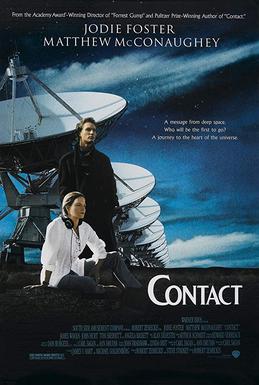Theological Notebook: The Movie "Contact" and the Myth of a Conflict Between Science and Religion
Here's a question: Why? In fact, that's my favourite question! But it's not too clear by itself, so let me give a little background so you can understand my specific use of the question.

( Read more... )

( Read more... )
Comments 23
Reply
Reply
Worse, I watched it over three class periods in a high school Physics class, where my teacher seemed to think it was the most brilliant articulation of "Science vs. Religion" ever made. Also he liked the part at the beginning where it zooms out past planets and other galaxies into the universe. (And he stopped it at every stage to explain what we were looking at and every five minutes thereafter to explain what had just happened. This is why it took us three class days.)
But I do love Jodie Foster!
Reply
As I try to look at this dynamic in our culture, as awful as I find both the political Right and the political Left, I think I have to blame the Secular Left on this score, for the smug dismissal of any more reflective look at Religion (in the Theological or Philosophical mode) because they've already been taught as dogma that it's all been disproved long ago, thus excusing them from doing the work themselves. I hope that's not dismissive, myself, or a gross caricature: it really does seem to be what I observe time and again.
Reply
Reply
It never really dawned on me until I read this, but I really should DESPISE this film, and for all the reasons you've listed here. And yet it's one of my favorite films of all time. Part of it is that I love space-y movies in general. I love Jodie Foster as an actress as well. And Jena Malone as the young Ellie was wonderful. But everything you've said here is spot on.
I printed out this post so I could read it at lunch time, and have it so marked up that I don't think I can even reply without copying half your post, LOL!
If you're at all interested, my running commentary on it is HERE.
If I wasn't so very exhausted, I'd say something more intelligent. So I guess I'll just say thanks for such a thoughtful commentary. Would it be ok to link to this on my journal?
Reply
I don't want to give the wrong impression: I love this movie, too, even if it annoys me at times by wallowing in misunderstandings or stereotypes that belie its lofty agenda or self-conception.
Yes, while recognizing Foster's great acting, Jena Malone gets props, too: I also wondered whether she used that gift or went on to do other things. (Huh. I just looked her up on IMDB and see that she has indeed continued acting. I see she worked on Foster's project The Dangerous Lives of Altar Boys, which a DRE friend of mine discussed with Foster at the Sundance Film Festival. And that she was the standout as the daughter in Stepmom, which I'd never put together....)
Now I"m off to your commentary....
Reply
Reply
Reply
Reply
Reply
PS This would be a good post for interacademia, which is sadly quiet at the moment... We need more people on board!
Reply
I really think that 'religion' is appallingly taught in the UK, and I am always heartened by novak's accounts of teaching high-school in the US. In the UK, I the pick-and-mix approach of most curricula up to age 16 seems to mean that religious studies is taught more as low-level anthropology (a description of social and cultural practices, with a superficial nod to the thoughts behind them) than as theology or philosophy. In trying to promote 'tolerance and understanding', we have reduced faith to a social activity.
I second the comment about interacademia. From a purely selfish perspective, I do not have enough scholarship influencing my life at the moment!
Reply
Reply
Reply
Leave a comment